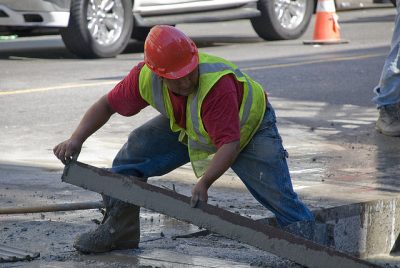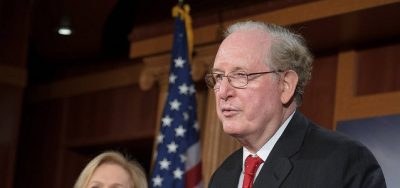Entrepreneurship & Innovation

Local Welcoming Initiatives Help Build a Nation of Neighbors
While attention has been focused on federal immigration efforts these last few months, states and cities continue to encourage and promote immigration as well. From well-established programs like Welcoming America and its many state-level affiliates, Cities of Migration, the Building Resilient Regions research group, and the Center for the Study of Immigrant Integration, to new programs like the Welcoming Cities and Counties initiative, the impetus to invite immigrants into our communities continues to grow. Read More

Immigrants are Key Driver of U.S. Talent and Economic Competitiveness
U.S. workers in science, technology, engineering, and mathematics (STEM) fields have been important contributors to American innovation, job creation, rising incomes, and global economic competitiveness throughout the years. And not surprisingly, immigrants have played a critical role in American innovation through STEM fields and all parts of the U.S. economy. A new report by Gordon Hanson (University of California, San Diego) and Matthew Slaughter (Dartmouth) describes these important relationships between talent, economic competitiveness, and immigration in the United States. In their paper, the authors present data in support of three critical points: Read More

Immigrants Boost Economic Vitality through the Housing Market
Abundant research shows that immigration is a net benefit to the United States’ economy. It leads to higher wages, business formation, job creation, and greater innovation – nationally and locally. Foreign workers who immigrate to the U.S. help alleviate labor force gaps left by a workforce increasingly nearing and entering retirement age. Furthermore, immigrants help fulfill growing healthcare needs of an aging population. In addition to these positive benefits of immigration, the favorable effect immigrant home-buyers have on the housing market is another important economic impact. Indeed, new research from the Americas Society/Council of the Americas and the Partnership for a New American Economy describes how the 40 million immigrants residing in the United States added $3.7 trillion to housing wealth in the U.S. The research, prepared by Jacob Vigdor at Duke University, uses county-level data on population and housing from the U.S. Census Bureau and American Community Survey from 1970 to 2010. The results show that immigration led to a boost in home values, particularly in neighborhoods hit hardest by the U.S. housing bust. Read More

Immigrants and Their Children Fill Gaps Left by Aging American Workforce
Over the next two decades, as the baby boom generation continues entering retirement, we will experience the largest exodus from the workforce by any generational cohort in American history. This wave of retirees will create a labor force deficit among the millions of jobs baby boomers depart from on top of new job growth industries create. Amid this great demographic shift, immigrants and their children are poised to play a critical role in filling workforce gaps left by massive baby boom generation retirements over the next twenty years, as a new forward-looking report from the Center for American Progress describes. Read More

Immigrant Entrepreneurs Grow Industries and Create Jobs
As you might suspect, immigrant entrepreneurs are key drivers in the transportation, food and building services industries. And a recent report from the Immigrant Learning Center (ILC) shines a spotlight on immigrant entrepreneurship in these industries, with a particular geographic focus on Massachusetts, New York, and Pennsylvania. Concerning the three industry areas, the ILC study – through an analysis of public data and interviews with immigrant business owners and industry representatives – finds the following: Read More

How Immigrant Entrepreneurs Fare in the New Immigration Bill
With the Senate Judiciary Committee’s vote last week to pass S.744 on to the Senate floor, a new proposal for spurring immigrant entrepreneurship and innovation will be before Congress. Title IV, Subtitle H of the bill creates the INVEST visa (Investing in New Venture, Entrepreneurial Startups, and Technologies) for immigrant entrepreneurs. This new visa program would allow immigrant entrepreneurs to come to the United States, start businesses, and create jobs in America. There would be two types of INVEST visas. A nonimmigrant INVEST visa would be renewable provided certain initial investment, annual revenue, and job creation criteria are met within an initial three-year period. The immigrant version of the INVEST visa would have basically the same criteria just at higher thresholds. The committee also adopted an amendment that permanently authorizes the EB-5 Regional Center Program, which has created tens of thousands of American jobs and attracted over $1 billion in investments since 2006. Read More

The W Visa: Why the Economy Benefits from A Robust New Worker Program
The Senate Judiciary Committee returns to its task of marking up S. 744 tomorrow, taking up, among other things, possible amendments to the W visa program for new nonimmigrant workers. This new program, blessed by both business and labor, is an effort to acknowledge the need for a more flexible system for meeting the demand for workers in certain occupations and industries that require less-skilled workers. At Tuesday’s hearing, several Senators challenged the idea that the American workforce needed to be supplemented with immigrant labor, but the evidence is overwhelming that there is both a need and an economic benefit to having a flexible and responsive program in place to bring in new workers where they are most needed. Read More

Facts About H-1B Workers and the Innovation Economy
While widespread research documents a critical need for skilled workers in the United States to maintain and strengthen our innovation industry, myths exist in opposition to programs designed to help alleviate that shortage. In particular, the H-1B visa program for high-skilled foreign-born workers, primarily used for science, technology, engineering, and mathematics (STEM) fields, is a routine recipient of critical ire. As the Senate Judiciary Committee discusses H-1B reforms in Title IV of S.744, here we dispel some of the common myths associated with the H-1B high-skilled visa program. Read More

The Important Role of Immigrants in America’s Innovation Economy
This week, the U.S. Senate Committee on Commerce, Science, and Transportation weighed in on immigration reform with a hearing on the role of immigrants in America’s innovation economy. Remarks from Sens. Rockefeller (D-WV) and Thune (R-SD) noted the contributions of immigrant innovators and entrepreneurs. Immigrants in the United States were named as inventors or co-inventors on 25.6 percent of international patent applications filed from the U.S. in 2006. Furthermore, temporary workers and permanent residents made contributions to over half of the international patents filed by several large, multi-national companies. Temporary and permanent foreign-born workers represent at least 24 percent of the nation’s scientists and 47 percent of engineers with doctoral degrees. Read More

New Heritage Report Ignores Broad Consensus on Economic Benefits of Reform
Today, the Heritage Foundation released a report that attempts to assess the fiscal costs associated with legalizing the 11 million unauthorized individuals living in the United States. The new report is similar to a 2007 study, which was widely criticized at the time of publication and continues to be refuted today by conservatives like Republican budget hawk Paul Ryan, former head of the Congressional Budget Office under President Bush, Douglas Holtz-Eaken, anti-tax activist Grover Norquist and the libertarian Cato Institute. In addition, the Bi-Partisan Policy Institute’s Immigration Task Force (which includes Condoleeza Rice and Haley Barbour) remarked on the report after its release noting, “we strongly believe that this study’s modeling and assumptions are fundamentally flawed because they do not account for the many contributions that an appropriately reformed immigration system can afford our economy and our country.” Read More
Make a contribution
Make a direct impact on the lives of immigrants.
